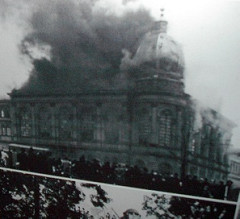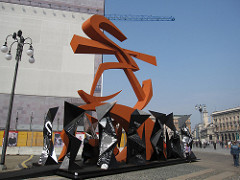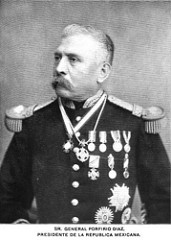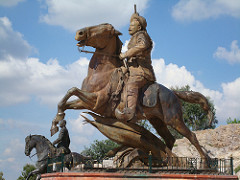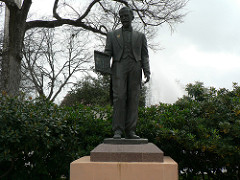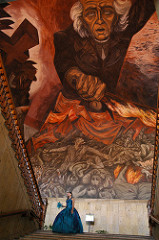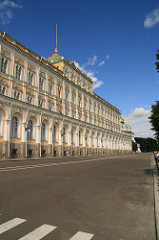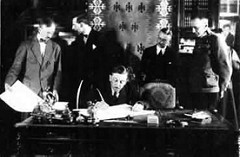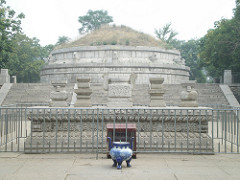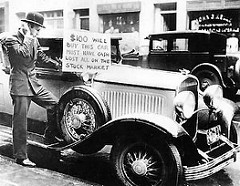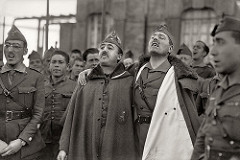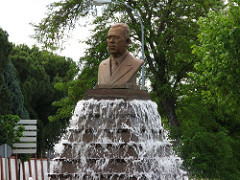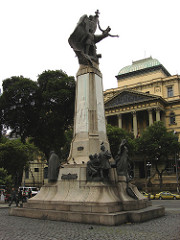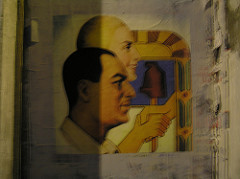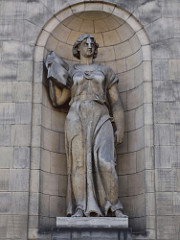Kristallnacht
(Night of the Broken Glass) November 9, 1938, when mobs throughout Germany destroyed Jewish property and terrorized Jews.
Mass Consumption
When large amounts of a single product are consumed by a large portion of the population for a sustained period of time. the demand for the product is steady and is assumed by the population to be available at any time.
Cubist Movement
20th Century art style; best represented by Spanish artist Pablo Picasso; rendered familiar objects as geometrical shapes
Benito Mussolini
Fascist dictator of Italy (1922-1943). He led Italy to conquer Ethiopia (1935), joined Germany in the Axis pact (1936), and allied Italy with Germany in World War II. He was overthrown in 1943 when the Allies invaded Italy.
Red Scare
Outbreak in U.S, began in 1919, as a result of communism in Russia, American radicals embracing communism followed by a series of mail bombings frightened Americans. Attorney General A. MItchell Palmer led effort to deport aliens without due processs, with widespread support. Did not last long as some Americans came to their senses. Sacco/Vanzetti trial demonstrated anti-foreign feeling in 20's. Accused of armed robbery & murder, had alibis. "Those anarchists bastards". Sentenced to death and executed.
Facism
Mussolini's invention, right-wing radicalism or revolution from the right, seeks to bring about change, anticommunist, anti capitalist, antidemocratic, characterized by hyper nationalism and a state-sponsored campaign of racial and ethnic bigotry
Syndicalism
Economic and political system based on the organization of labor; imported in Latin America from European political movements; militant force in Latin American politics
Isolationism
Elite opinion opposed getting involved in European wars in the U.S; adopted after WWI
Mexican Revolution
Fought over a period of almost 10 years form 1910; resulted in ouster of Porfirio Diaz from power; opposition forces led by Pancho Villa and Emiliano Zapata
Porfirio Diaz
A dictator who dominated Mexico, permitted foreign companies to develop natural resources and had allowed landowners to buy much of the countries land from poor peasants, Had power 1876-1911
Pancho Villa
Mexican revolutionary and military commander in northern Mexico during the Mexican Revolution; succeeded along with Emiliano Zapata in removing Diaz from power; also participated in campaigns that removed Madero and Huerta
Francisco Madero
Moderate democratic reformer in Mexico; proposed moderate reforms in 1910; arrested by Porfirio Diaz; initiated revolution against Diaz when released from prison; temporarily gained power, but removed and assassinated in 1913
Emiliano Zapata
Mexican revolutionary and military commander of peasant guerrilla movement after 1910 centered in Morelos; succeeded along with Pancho Villa in removing Díaz from power; also participated in campaigns that removed Madero and Huerta; demanded sweeping land reform.
Plan de Ayala
Written by Zapata after he was angry with Madero for not enforcing land reform, rejection of Madero's presidency, reform of political landscape
Victoriano Huerta
Attempted to reestablish centralized dictatorship in Mexico following the removal of Madero in 1913;(FAILED) forced from power in 1914 by Villa and Zapata
Alvaro Obregon
Emerged as Mexico's leader at the end of the revolution; wrote a new constitution that promised land reforms
Mexican Constitution of 1917
Promised land reform, limited foreign ownership of key resources, guaranteed the rights of workers, and placed restrictions on clerical education; marked formal end of Mexican Revolution.
Diego Rivera
Mexican artist of the period after the Mexican Revolution; famous for murals painted on walls of public buildings; mixed romantic images of the Indian past with Christian symbols and Marxist ideology.
Jose Clemente Orozco
Mexican muralist of the period after the Mexican revolution; like Rivera's, his work featured romantic images of the Indian past with Christian symbols and Marxist ideology
indigenism
the concern for the indigent peoples and their contribution that was below many reforms after indianization in the works of Diego Rivera and Jose Clemente Orozco.
Corridos
Narrative song and poetry form, a ballad, of the mestizo Mexican cultural area
ejidos
Land taken away from landlords and foreigners and redistributed to peasants.
PRI
Institutional Revolutionary Party which dominated Mexican politics and claimed to represent all groups
Cristeros
Conservative peasant movement in Mexico during the 1920s; most active in central Mexico; attempted to halt slide toward secularism; movement resulted in armed violence.
Alexander Kerensky
Liberal revolutionary leader during the early stages of the Russian Revolution of 1917; sought development of parliamentary rule, religious freedom
Lenin
Founded the Communist Party in Russia and set up the world's first Communist Party dictatorship. He led the October Revolution of 1917, in which the Communists seized power in Russia. He then ruled the country until his death in 1924.
October Revolution
The seizure of power by force by the Bolsheviks from the Provisional Government (that had replaced Tsar Nicholas II after the February Revolution) in November of 1917. After the forceful seizure of power, Lenin set himself up as the first head of a Marxist state with aspirations to change the country, making several decrees in his effort use socialist ideas (Confiscation of large estates and businesses & establishment of political monopoly- no rival political parties).
Red Army
Military organization constructed under leadership of Leon Trotsky, Bolshevik follower of Lenin; made use of people of humble background
New Economic Policy
Instituted by Lenin in 1921 - the state continued to set basic economic policies, but now efforts were combined with individual initiatives. This policy allowed food production to recover
Supreme Soviet
Parliament of Union of Soviet Socialist Republics; elected by universal suffrage; actually controlled by Communist party; served to ratify party decisions.
Union of Soviet Socialist Republics
Federal system of socialist republics established in 1923 in various ethnic regions of Russia; firmly controlled by Communist party; diminished nationalities protest under Bolsheviks; dissolved 1991.
Comintern
International office of communism under USSR dominance established to encourage the formation of Communist parties in Europe and elsewhere.
Treaty of Brest-Litovsk
After losing major territory the Russians surrendered and agreed to sign this treaty. The treaty sliced about a third of the Russians western territory away. This officially brought the end of the Russian empire. Was signed by Lenin.
Joseph Stalin
Successor to Lenin as head of the USSR; strongly nationalist view of Communism; represented anti-Western strain of Russian tradition; crushed opposition to his rule; established series of five-year plans to replace New Economic Policy; fostered agricultural collectivization; led USSR through World War II; furthered cold war with Western Europe and the United States; died in 1953.
Collectivization
Creation of large, state-run farms rather than individual holdings; allowed more efficient control over peasants; part of Stalin's economic and political planning; often adopted in other Communist regimes.
Puyi
Last emperor of China at end of Qing Dynasty; deposed as emperor while still a small boy in 1912
Yuan Shikai
Warlord in northern China after fall of Qing dynasty; hoped to seize imperial throne; president of China after 1912; resigned in the face of Japanese invasion in 1916.
21 Demands
In 1915, Japan presented Yuan Skikai with this, which sought to make China a Japanese protectorate. Yuan was too weak to resist some of the demands, made his nationalism less popular in the eyes of the common people, and because Mao Zedong said he would not surrender it gave him and the communists more power.
May Fourth Movement
Resistance to Japanese encroachments in China began on this date in 1919; spawned movement of intellectuals aimed at transforming China into a liberal democracy; rejected Confucianism.
Ba Jin
A modern Chinese author born in 1904 who wrote multiple short stories/ novels, including the trilogy Family, Spring, and Autumn, which portrayed a family who's younger members try to break away from the elder's Confucian ideas; he sometimes isolated himself in his study for a year
Mao Zedong
Communist leader in revolutionary China; advocated rural reform and role of peasantry in Nationalist revolution; influenced by Li Dazhao; led Communist reaction against Guomindang purges in 1920s, culminating in Long March of 1934; seized control of all of mainland China by 1949; initiated Great Leap Forward in 1958.
Li Dazhao
Chinese intellectual who gave serious attention to Marxist philosophy; headed study circle at the University of Beijing; saw peasants as vanguard of revolutionary communism in China.
Guomindang
Nationalist political party founded on democratic principles by Sun Yat-sen in 1912. After 1925, the party was headed by Chiang Kai-shek, who turned it into an increasingly authoritarian movement.
Chiang Kia-Shek
The military subordinate of Sun Yat-Sen, became head of nationalist party (GMD) when Sun yat-sen died of cancer, he tried to get rid of the communists by first pretending to support an alliance with them, and then striking out and making them go into hiding, he had a strong commitment to Sun Yat-sen's Three People's Principles and Ideas
Whampoa Military Academy
Founded in 1924; military wing of the Guomindang; first head of the academy was Chiang Kai-shek
Long March
Communist escape (6,000-mile)- (9,600-kilometer) from Hunan province during civil war with Guomindang in 1934; center of Communist power moved to Shaanxi province; firmly established Mao Zedong as head of the Communist party in China.
Great Depression
International economic crisis following the First World War; began with collapse of American stock market in 1929; actual causes included collapse of agricultural prices in 1920s; included collapse of banking houses in the United States and western Europe, massive unemployment; contradicted optimistic assumptions of 19th century.
Kreditanstalt
In May 1931, this bank in Vienna that was the major institution for much of central and eastern Europe collapsed; German economy very nearly collapsed and Germany could no longer pay reparations. Worsen the worldwide Great Depression.
Popular Front
Combination of Socialist and Communist political parties in France; won election in 1936; unable to take strong of social reform because of continuing strength of conservatives; fell from power in 1938
New Deal
President Franklin Roosevelt's precursor of the modern welfare state (1933-1939); programs to combat economic depression enacted a number of social insureance measures and used government spending to stimulate the economy; increased power of the state and the state's intervention in U.S. social and economic life.
Gestapo
The secret police force of the German nazi state, notorious for its terrorism and brutality
Totalitarian State
A new kind of government in the 20th century that exercised massive, direct control over virtually all the activities of its subjects; existed in Germany, Italy, and the Soviet Union.
Nuremberg Laws
A group of laws that placed severe restrictions of Jews, prohibited from marrying non- Jews, attending schools or universities, holding government jobs, practicing law or medicine or publishing books.
Anchluss
The uniting of Austria and Germany as one country.
Spanish Civil War
War pitting authoritarian and military leaders in Spain against republicans and leftists between 1936 and 1939; Germany and Italy supported the royalists; the Soviet Union supported the republicans; led to victory of the royalist forces.. Francisco Franco wins.
Francisco Franco
Spanish General; organized the revolt in Morocco, which led to the Spanish Civil War. Leader of the Nationalists - right wing, supported by Hitler and Mussolini, won the Civil War after three years of fighting.
Falange
A Spanish facist party that supported Francisco Franco during the Spanish civil war
Lazaro Cardenas
President of Mexico from 1934 to 1940; responsible for redistribution of land (44 million acres), primarily to create ejidos, or communal farms; also began program of primary and rural education. Nationalized oil industries that refused to obey state laws and created state monopoly.
Corporatism
Political ideology that emphasized the organic nature of society and made the state a mediator, adjusting the interests of different social groups; appealed to conservative groups in European and Latin American societies and to the military.
Getulio Vargas
Elected president of Brazil in 1929; launched centralized political program by imposing federal administrators over state governments; held off coups by communists in 1935 and fascists in 1937; imposed a new constitution based on Mussolini's Italy; leaned to communists after 1949; committed suicide in 1954.
Estado Novos
"New State". Authoritarian regime in Brazil, instituted by Vargas. Ruled from 1947-1945.
Juan D. Peron
Military leader in Argentina who became dominant political figure after militiary coup in 1943; used position as Minister of Labor to appeal to working groups and the poor; became President in 1946, forced into exile in 1955, returned and won presidency in 1973
Korekiyo Takahashi
Minister of finance in Japan during the 1930s; increased government spending to provide jobs; created export boom and elimination of military spending.
Five year plans
Stalin's plans to hasten industrialization of USSR; constructed massive factories in metallurgy, mining and electric power; led to massive state-planned industrialization at cost of availability of consumer products. Increased machinery outut 14 fold in 10 years and let it become the world's third biggest industrial power.
Socialist Realism
Attempt within the USSR to relate formal culture to the masses in order to avoid the adoption of Western European cultural forms; begun under Joseph Stalin; fundamental method of Soviet fiction, art, and literary criticism.
MVD
Ministry of Internal Affairs in Imperial Russia, later USSR, the secret police.
Politburo
The executive committee of the Soviet Communist party; 20 members
Lebensraum
Idea that Germany was too crowded and needed more living space, Hitler promised space by invading Europe and Russia
